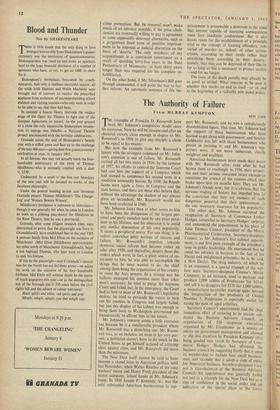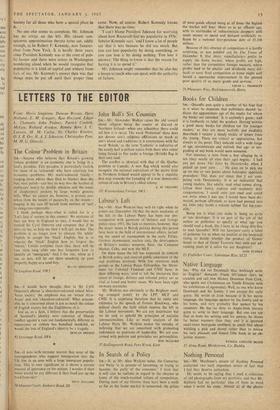The Authority of Failure
From MURRAY KEMPTON
THE triumphs of Franklin D. Roosevelt have been Mr. Johnson's compulsive model since his accession. Now he will be inaugurated after an electoral victory close enough in degree to Mr. Roosevelt's in 1936 to give any disciple a claim to be equal to his master.
But now the example from Mr. Roosevelt's tenure with the strongest command on Mr. John- son's attention is one of failure. Mr. Roosevelt carried all but two states in 1936; by the summer of 1937, his efforts to control the Supreme Court had cost him the support of a Congress which had seemed to commence his second term in a condition unmixedly bovine. By 1938, the Repub- licans were again a force in Congress and the state houses, and there are those who believe that, without the advantage the shadow of war always gives an incumbent, Mr. Roosevelt would not have been re-elected in 1940.
Mr. Johnson looks then at what seems to him to have been the dissipation of the largest per- sonal and party mandate held by any prior presi- dent in his lifetime, and his obsession is to avoid any similar diminution of his own popularity. It seems a peripheral worry. For one thing, it in- volves somewhat petty notions of success and failure. Mr. Roosevelt's impulses towards domestid social reform had become rather an echo after 1938; and thereafter, despite those dis- orders which were, in fact, a great source of en- joyment to him, he was able to accomplish the things that he most wanted to do, the chief among them being the organisation of his country to resist the Axis powers. In a strange way his failures damaged his enemies more than other men's successes; he tried to purge the Supreme Court and failed, but, in the emergency, the Court had to bow to most of Mr. Roosevelt's legislative desires; he tried to persuade the voters to turn out his enemies in Congress and largely failed, but just this display of his kidney was enough to bring them back to Washington determined not unnecessarily to affront him in the future.
Mr. Johnson's concern seems a little excessive too because he is a comfortable president where Mr. Roosevelt was a disturbing one. Mr. Roose- velt was, as an instance, an issue in his very per- son; a politician doesn't have to do much in the United States to get himself accused of arraying class against class, and Mr. Roosevelt did more than the minimum.
The New Deal itself cannot be said to have become a closed issue in American politics until last November, when Walter Reuther of the auto workers' union and Henry Ford, president of the motor company, joined hands in Mr. Johnson's troop. In 1936 Joseph P. Kennedy, Sr., was the only substantial American businessman to sup- port Mr. Roosevelt, and he was a conspiciously disestablished figure. This time. Mr. Johnson had the support of those businessmen who have learned to get along with government; and Senator Goldwater was left with those businessmen who persist in resisting it; and Mr. Johnson's sup- porters were, if not more numerous, clearly weightier and wealthier.
American businessmen never made their peace with Mr. Roosevelt alive; even after he had beaten them so crushingly in 1936, their proper- ties and their animus remained intact enough-to constitute the arsenal of the counter-attack that broke upon him six months later. They are Mr. Johnson's friends now; but it is obvious that his nervous reading of history has impelled him to the conviction that they are enemies of such dangerous potential that their appeasement is the one necessary. insurance for his popularity.
The other day, Mr. Johnson accepted the resignation of Secretary of Commerce Luther Hodges, somewhat to Secretary Hodges' surprise, and announced the appointment in his place of John Thomas Connor, president of the Merck Pharmaceutical Corporation. Secretary-designate Connor, as Mr. Johnson's first cabinet appoint- ment, is our first pure example of the president's taste in public leadership. He announced that he owed his advance in business to the fact of his liberal and enlightened principles; he is, he said, a New Dealer. The drug industry, of which he is an ornament, is a special triumph of the wel- fare state. Secretary-designate Connor's Merck Company, as an instance, used to package and produce 1,000 tablets of Prednisone for $13.61 and sell it to druggists for $170 for 1,000 tablets, a manufacturer-to-retailer markup quite beyond the imagination of the producers of Chanel Number 5. Prednisone is especially useful for easing the pain of aged arthritics.
Secretary Connor's appointment had the chief immediate effect of restoring to its ancient sub- stance the Business Advisory Council, an organisation of 150 corporate executives organised by Mr. Eisenhower as a source of advice on government management and allowed to slip into inanition by President Kennedy after being goaded into revolt by Secretary of Com- merce Hodges. Hodges had affronted the business council by suggesting firstly that it open its membership to include four small busines, men, and secondly that it adopt a code of ethics for American business. Secretary-designate Con- nor is vice-chairman of the Business Advisory Council; his appointment was generally hailed not just as a triumph for the New Deal but as a sign of confidence in the social order and an indication of the special place in the Great
Society for all those who have a special place in it.
No one else seems to complain; Mr. Johnson has no critics on the left. His closest con- spicuous approximation thereto turns out, oddly enough, to be Robert F. Kennedy,, now Senator- elect from New York. It is hardly three years since President Kennedy was at the crest of pub- lic favour and there were voices in Washington wondering aloud when he would recognise that popularity is a kind of capital and withers from lack of use. Mr. Kennedy's answer then was that things must be put off until their proper time came. Now, of course, Robert Kennedy knows that there was no time.
'I can't blame President Johnson for worrying about how Roosevelt lost his popularity in 1936.' Senator Kennedy says. 'and I know a lot of people say that it was because he did too much. But you can lose popularity by doing something, or you can lose it- by doing nothing. You lose it anyway. The thing to know is that the reason for having it is to spend it.'
Mr. Johnson might remember that he also has a lesson to teach who can speak with the authority of failure.































 Previous page
Previous page